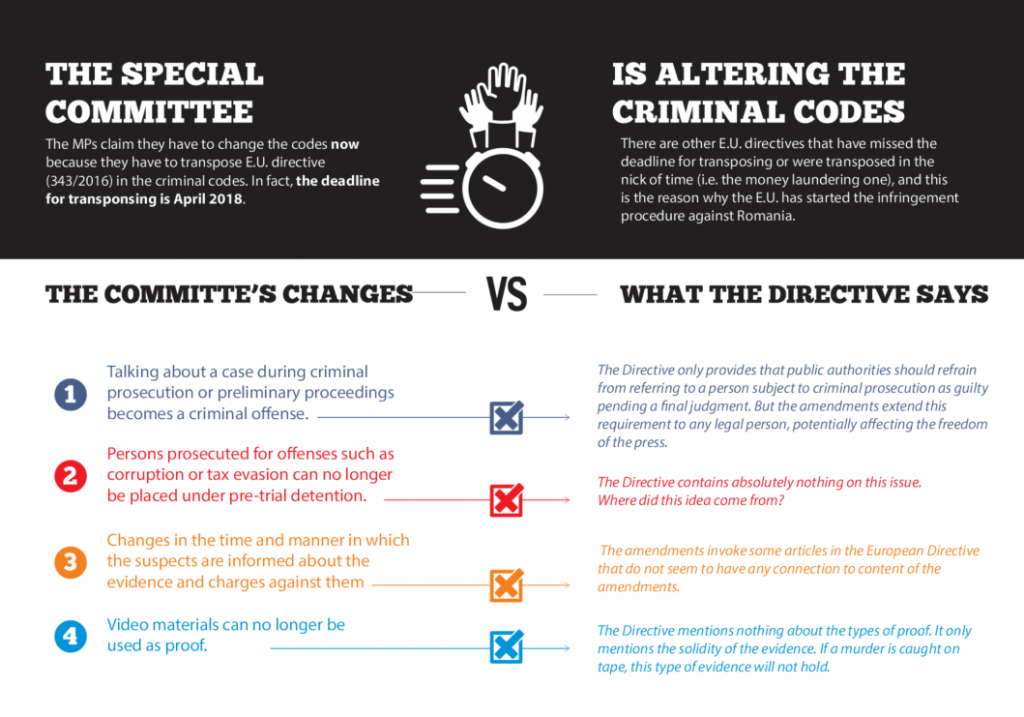
Context:
The Joint Special Committee of the Chamber of Deputies and the Senate for the systematization, unification and ensuring legislative stability in the field of justice (the “Iordache Committee”) announced on December 13th, that, although initially it was to suspend works during 14-16 December for the national mourning, it will work at least during 14 December to transpose EU Directive 2016/343 into the Criminal Code and the Criminal Procedure Code.
The very title of the legislative proposal reveals its purpose to transpose the European Directive into the national law. The Committee President, Florin Iordache, accused by the opposition to have proposed amendments to the criminal codes that go beyond the framework for transposing the Directive, said today about the proposed amendments: “They do not go beyond the framework of the directive”.
Our fact-checking initiative has verified whether his claim is true or false. Specifically, we check to see if the proposals under discussion with the Iordache Committee are actually meant to transpose EU Directive 2016/343. We do not check their necessity or their particular impact, but we focus our analysis strictly on verifying the assumption that these amendments to the Criminal Code and the Criminal Procedure Code rely upon – are they really about transposing the European Directive? You can read the whole fact-check here.
Conclusion:
Based on our analysis, a conclusion can be drawn that, as shown by the amendments proposed by the Iordache Committee today, the justification behind the amendment of the Criminal Code and of the Criminal Procedure Code in the light of the need to transpose the provisions of EU Directive no. 2016/343 into the national legislation is partly false . We do not question whether they are good or not, but we do question their link to transposing European legislation into the national law. The statement of the president of the special committee that the amendments brought to the criminal codes do not exceed the framework of the Directive is at least partly false.
First of all, the deadline for transposing the Directive is April 2018, which does not explain any hurry to adopt the changes now, in a fast forward procedure.
Second of all, regarding the contents of the amendments proposed by the majority coalition, we identified at least four major changes which do not seem to be related to the transposition of the Directive, which we summarize in the simplest manner possible (see the technical details in the table from the detailed fact-check):
- Turning the communication of case information during criminal prosecution or preliminary proceedings into a criminal offense – contrary to the Directive – the Directive only provides that public authorities should refrain from referring to a person subject to criminal prosecution as guilty pending a final judgment. The amendments change into a criminal offense any communication not only from public authorities, but also from any natural and legal person. According to the amendments, it is forbidden not only to call a person “guilty”, but also to refer to actions and persons, although the Directive expressly provides that any provisions on the freedom of the press should not be affected.
- Removing the possibility to place persons prosecuted for offenses such as corruption or tax evasion under pre-trial arrest – no connection to the Directive – the proposed amendments refer to the need to transpose the provisions of the Directive regarding the presumption of innocence, but there is no distinction between various types of offenses in the Directive. In this case, the Directive seems to be just a pretext, with no connection whatsoever to the contents of the amendment.
- Changes in the time and manner in which the persons subject to prosecution are acknowledged the evidence and charges on file – no direct connection to the Directive – the amendments proposed oblige prosecutors to announce the persons subject to prosecution about the evidence produced or about the fact they have reasonable suspicion, which is already covered by legislation. The invoked articles in the European Directive do not seem to have any connection to the amendments made.
- By a rather particular diligence, one of the amendments removes means of proof such as video materials – no connection to the Directive – the amendments fully repeal, under the pretext of complying with the need to have no doubt on a person being (not) guilty, an article which allowed, for example, the use of video materials in criminal prosecution. At this point, it appears that if photos are used there is no doubt, but when videos are used, there may be doubts. In this case as well, the Directive says nothing about the type of evidence produced, but about such evidence being grounded.


It is the same the world over. We elect people who look good, speak well, and dress well – forgetting that crooks and psychopaths love politics for the opportunity it gives to get rich without working. The next thing they do once elected is to pack the civil service with their friends, giving them the power to regulate in their favour.
There should be a strict limit on the number of civil servants paid for with taxpayers’ money. There should also be lifestyle audits of all politicians. Anyone leaving office richer than when they were elected should immediately be subject to close investigation and fined.
Bravo the DNA!